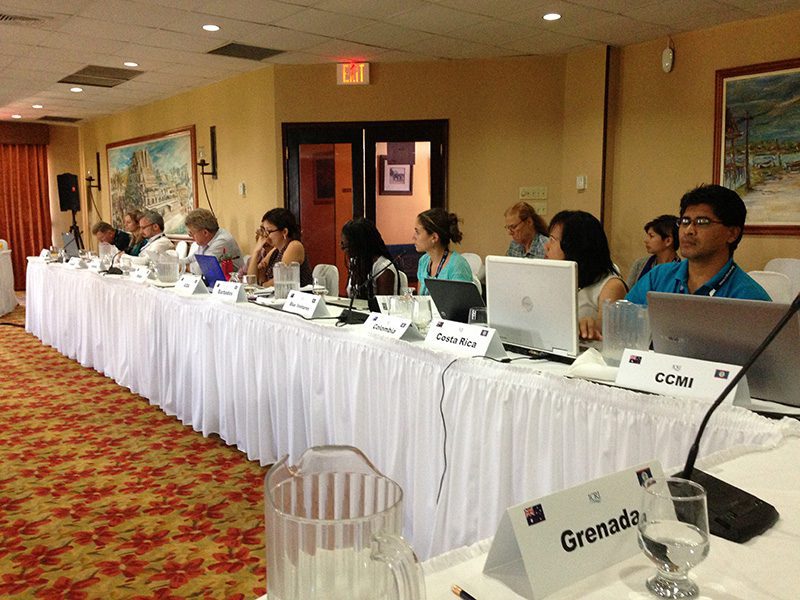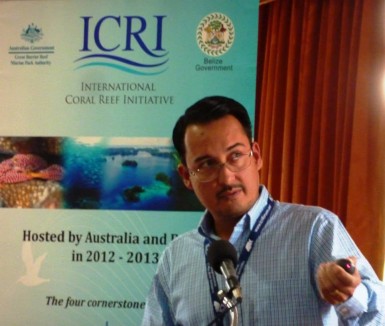
The International Coral Reef Initiative’s 28th General Meeting took place at the Radisson Fort George Hotel in Belize City, 14-17 October 2013. Photo credit: Martin Russell
The International Coral Reef Initiative (ICRI), formed of 60 members comprising governments, international, intergovernmental and non-governmental organisations, held its 28th General Meeting (GM28) in Belize City, October this year.
A year ago, Blue Ventures joined this global partnership, which strives to preserve healthy coral reefs through four foundations: management, capacity building, research and monitoring, and review.
After the official opening by Belize’s Minister of Forestry, Fisheries and Sustainable Development, Hon. Lisel Alamilla, updates on member’s activities and Ad-Hoc Committees, including the Regional Lionfish Committee (RLC), were presented.

ICRI is formed of 60 members, representing governments, international, intergovernmental and non-governmental organisations. Photo credit: ICRI
The RLC’s presentation formed the official launch of the Regional Lionfish Strategy, which is intended to guide and coordinate the actions of groups concerned and affected by the lionfish invasion in the Caribbean, for the fulfillment of five core objectives:
I. Facilitate collaboration among governments, reef-reliant industries, civil society, and academia by providing mechanisms for coordination of efforts across political and geographical boundaries,
II. Encourage a coordinated research and monitoring agenda,
III. Encourage governments to review and amend relevant legislation and, if necessary, develop new regulations and policies to control lionfish,
IV. Control invasive lionfish populations where possible using regionally coordinated, effective methods, and
V. Provide education, information, and outreach mechanisms to generate public support and foster stewardship in invasive lionfish programmes.
Blue Ventures’ invasive lionfish research, monitoring and management programmes in Belize meet many of the identified required actions for NGOs to take.

Ricardo Gomez Lozano, from Mexico’s National Commission of Protected Areas (CONANP), presents the Regional Lionfish Strategy at ICRI GM28. Photo credit: ICRI Secretariat.
Delegates at the ICRI GM28 were also treated with a preview of the Global Coral Reef Monitoring Network’s (GCRMN) latest report, which will be made freely available through the GCRMN website later this year. Spanning over forty years of monitoring, this is the most comprehensive synthesis ever of reef health in the Caribbean.
The report, authored by Jeremy Jackson and Mary Donovan, interpreted patterns of change using historical events and metadata, including disease outbreaks, hurricanes, water quality, growth in tourism and climate change.
The results clearly show overfishing to be the driver for reef health decline in the Caribbean, specifically the role that key herbivores such as parrotfish play in reef recovery following both natural and anthropogenic disturbance events. In response to this, the delegation adopted a recommendation to Caribbean governments to take action to protect parrotfish, either through gear restrictions or outright fishing bans.
Belize banned the fishing of herbivores in 2009 in recognition of the critical function they play in preventing coral reefs undergoing a phase shift to a landscape dominated by fleshy macroalgae – seaweeds. Analysis of data collected by our expeditions suggests that such a phase shift may have already occurred in Bacalar Chico; research projects on Diadema sea urchins, parrotfish and habitat connectivity further explore prospects to aid recovery.
Three resolutions were also adopted at the meeting, including the encouragement for NGOs and government to enter co-management agreements for the management of coral reefs, as well as updates to the foundational documents of ICRI. Adopted at the first ICRI general meeting in 1995, the Call to Action and Framework for Action have been updated to reflect the “overwhelming scientific consensus that the Earth’s climate is changing,” and the significant impact that such changes are already having on coral reefs, and the continuing need for integrated resource management that recognises the connectivity of land and sea.
The successful meeting culminated with the official handover ceremony of the ICRI Secretariat from its current hosts, Australia and Belize, to new hosts, Japan and Thailand, followed by an evening celebrating the signing of the co-management agreement for Turneffe Atoll Marine Reserve between the Belize Fisheries Department and the Turneffe Atoll Sustainability Association.

